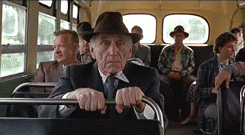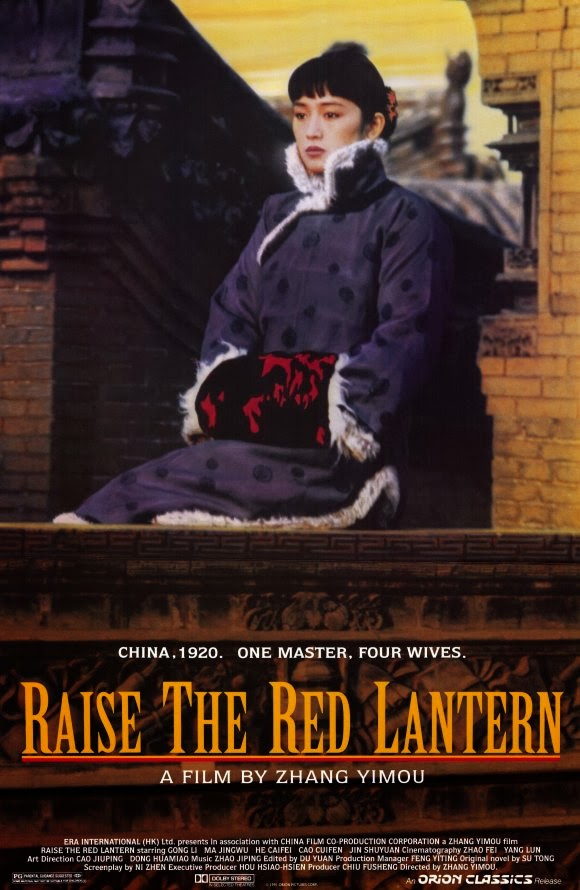The Shawshank Redemption (1994)
If you ask someone to tell you the first thing that comes to mind when they hear the term "prison break movie", chances are they will start whistling or humming the main theme of The Great Escape (1963), recently paid homage to in the excellent Chicken Run (2000). They're both very lighthearted movies about never losing hope and the desire of wanting to be free. The Shawshank Redemption, on the other hand, while still revolving around the same themes, is much darker in its approach, being closer in structure to Escape From Alcatraz (1979). Differently from the latter, though, which focused exclusively on the escape, The Shawshank Redemption transcends its prison movie label by focusing on character development instead, managing to become an experience rather than a movie. Unfortunately, it was released in the same year as the critic's sweetheart Forrest Gump, which stole a lot of its thunder (Ebert himself, at the time, considered Forrest Gump as being the better movie, awarding it 4 stars, whereas The Shawshank Redemption received 3 1/2 stars in his original review). Even though I like both movies very much, The Shawshank Redemption is now in Ebert's Great Movies list, while Forrest Gump is not...
The movie tells the story of Andy Dufresne (Tim Robbins), a banker condemned to two life sentences for killing his wife and her lover, as seen by Ellis 'Red' Redding (Morgan Freeman). Even though Andy has always said he was innocent, as Red cleverly points out, "everybody's innocent in here. Didn't you know that?". Red is the man who can get things smuggled into the prison, managing to get for Andy poster of Rita Hayworth and a small hammer for shaping rocks that, as Red observes, "it would take a man 600 years to tunnel through the wall with it". Time passes by, and Andy, by being the brilliant banker he is, starts by arranging for a prison guard to get a US$35,000 tax-free inheritance, ending up doing the taxes for all guards in the prison and, afterwards, to the ward himself (Bob Gunton). The ward would later on start a program where inmates would be put to work for the community at a minimum of expense for the tax payers, which led to Andy doing a great deal of creative accounting to the warden's benefit. With his sole chance of getting a retrial ruined by the warden, who, understandably so, did not want to lose him, Andy decides he had enough and, taking advantage of a stormy night, escapes though the tunnel he had been building for the last 17 years, concealed behind the poster in his cell wall. Some time after that, Red is finally considered redeemed by the eyes of the parole board and released from Shawshank. He, who had up to that point always considered hope to be a dangerous thing, now feels the flame of hope once again burn inside him, as he yearns to meet Andy, thus asserting Andy's words that "hope is a good thing, maybe the best of things, and no good thing ever dies".
The Shawshank Redemption was written and directed by The Walking Dead mastermind Frank Darabont, adapted from the Stephen King novella Rita Hayworth and the Shawshank Redemption (available here). Darabont would go on to adapt two other of King's stories, The Green Mile (1999) and The Mist (2007), both highly recommended by me (not by Ebert, though, who didn't quite like The Mist).
 |
| Brooks (James Whitmore) |
I strongly believe Darabont hit a bull's eye when he decided to make his script character-centric, something that could have elevated Escape From Alcatraz to a whole new level had it not ignored the certainly interesting stories of its players. Take for instance the sadistic warden in that movie: when he has his comeuppance, by being forced to acknowledge three prisoners had escaped from The Rock, we as an audience have not spent too much time with him to really care about what would happen to him as a consequence of that prison break; in this movie, however, we have been with the warden long enough to grow to despise him, making his punishment much better relished. Again doing a parallel with Escape From Alcatraz, after the elderly prisoner in that movie has his painting privileges removed due to a whim of the warden, he gets depressed to the extent of cutting off his own fingers with a hatchet; after that, he is never seen again or talked about. Now take Brooks (James Whitmore) in The Shawshank Redemption, a man who had spent 50 years inside the prison, thus growing to depend on the walls that kept him imprisoned. We don't know why he had been condemned to life in prison; we have, however, spent enough time with him and Jake, a crow fallen from its nest he had taken care of, to feel he had been rehabilitated and, consequently, to care about his fate. When Brooks panics for being released on parole after having spent his entire life inside Shawshank, we completely understand the reason why. Unlike the crow Jake, Brooks does not want to leave his cage, thus abandoning the life he knows and understands, as well as everything he had grown to be. Outside those walls, he is "just a used up con with arthritis in both hands", as Red remarks. Whitmore really shines in his portrayal of Brooks, particularly during a scene revolving around a letter sent from him describing his escape from parole. Truly heartbreaking.
 |
| Andy (Tim Robbins) |
As Andy was written as a taciturn guy, there is not much Tim Robbins can do to make him more interesting, as Andy is meant to be a man living behind a facade. He does have his moments, though. I particularly liked the nods to The Great Escape, in the way Andy used to get rid of the debris of his wall resulting from his digging an escape tunnel, and to Escape From Alcatraz, with Andy hiding inside the bible (right at Exodus -- nice touch...) the hammer he had been using to dig his tunnel. Also, I really enjoyed the scene in which he plays an aria from The Marriage of Figaro in the prison sound system, despite knowing he will be punished for it. The grin on his face when, after being told by the warden to shut the music off, Andy turns the volume all the way up! Priceless! About that episode, Red comments:
Nothing short of poetry.I have no idea to this day what those two Italian ladies were singing about. Truth is, I don't want to know. Some things are best left unsaid. I'd like to think they were singing about something so beautiful, it can't be expressed in words, and makes your heart ache because of it. I tell you, those voices soared higher and farther than anybody in a gray place dares to dream. It was like some beautiful bird flapped into our drab little cage and made those walls dissolve away, and for the briefest of moments, every last man in Shawshank felt free.
 |
| Red (Morgan Freeman) |
The greatest highlight of the movie is Morgan Freeman's Red, the one who is actually redeemed, as Andy had been innocent all along. This is partly due to the way the script was written, making the audience see Andy mostly though his eyes (thus reinforcing his bond with us, the audience), partly due to Morgan Freeman's talent as an actor, as well as a narrator. To watch him grow old with Andy, to listen to his confession of being afraid to be set free, as he, like Brooks before him, had also grown to face the walls surrounding him as a shell instead of a cage, to witness his sincere outburst during his fourth (?) parole hearing, after which he is finally set free, those are things one cannot write about, as there is no way they will do justice to what Morgan Freeman makes of his role.
My only bit of nitpicking is, how come Red could manage to remember the name of a town he had never heard of before, during a brief, out-of-context conversation with Andy while he was worried to death than Andy would commit suicide if left alone??? I mean, there was no point during the movie in which Red was praised for his memory skills...
Summarizing it:
Liked
|
Didn't like
|
|---|---|
It takes everything that Escape From Alcatraz did right and expands upon it greatly by focusing on the individual stories of the characters involved.
|
Aside of some nitpicking, nothing I can think of, really...
|
One of my favorite lines, which embodies in itself every prison break movie I have ever seen:
Great Movie review by Roger Ebert here.
If you liked this movie, then maybe try watching Jean Renoir's La Grande Illusion (1937).





Comments
Post a Comment